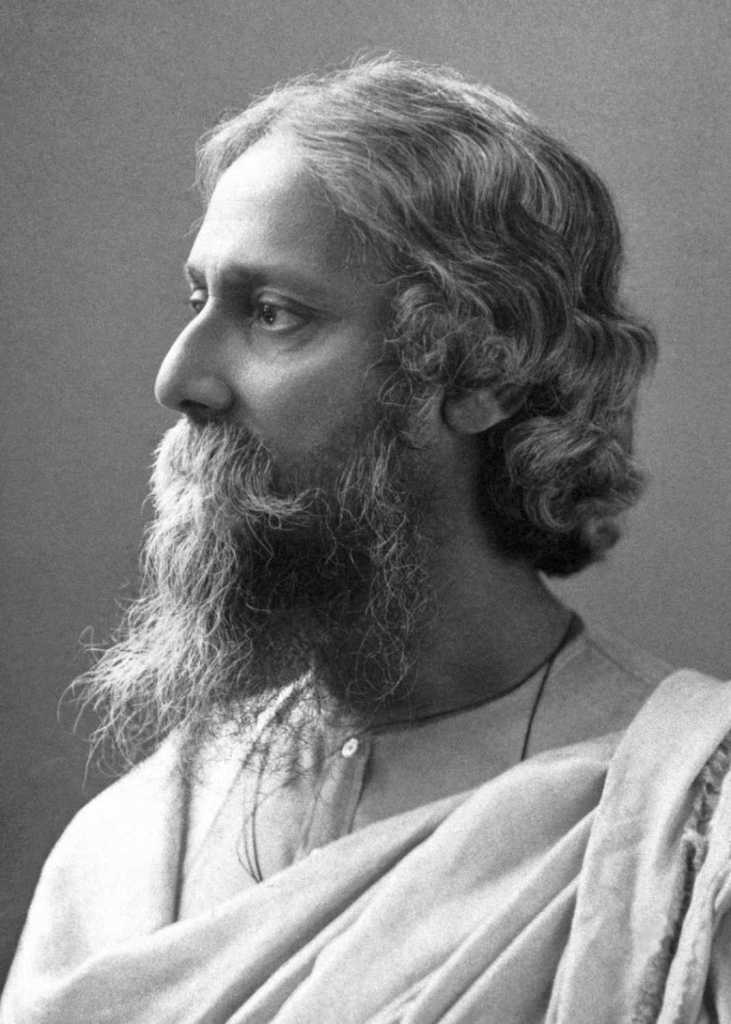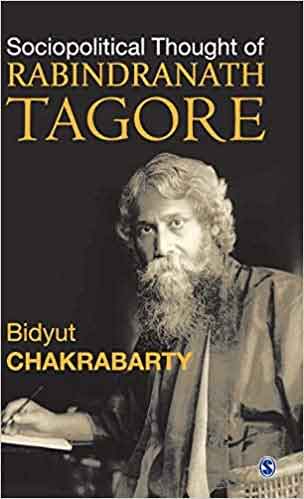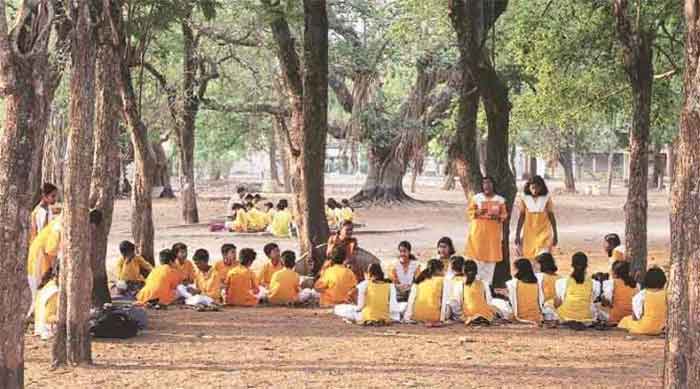
Rabindranath Tagore was far far away from what we popularly call patriotism. Our problem is that more we have been able to erase his ideals and ideas from our everyday life; more we have been able to be ‘Rabindrik.’ It is indeed sad to recognize this bitter truth. Our understanding of Rabindranath is confined to a mere recitation of his songs or keeping one or two copy from his vast literary oeuvre in our drawing room-book shelf. And we think we have entirely grasped his thoughts and ideas and we become extremely proud as a worshipper of this evergreen versatile thinker. ‘Not that the very young people care or have the time or money to go through all his works Rabindrasangeet is enough for them, and there is so much of it these days that one gets tired and smells something behind the propagation of Tagore culture through music.’[i]
Tagore was one of the greatest thinkers of the world of all ages. He was a ‘karmayogi’—a tireless man of action. We need to go beyond his songs and poetry. And there we find the artist in multiple shades. He was a universal man. He was beyond the periphery of national borders. He was never touched by the narrowness of caste, creed, religion or region. That is why Rabindranath is ever relevant to us and the world. And he was ever ready to supply us food for thought in rain, summer or winter.
Rabindranath was never a blind patriot. Rather we can say he was a worshipper of truth and justice. Unlike our present day clay-footed intellectuals he was always outspoken to uphold the sanctity of truth and justice. He fought against ills and odds and championed the cause of humanity in his life-long struggle. He criticized the blind form of patriotism which is now enjoying a hay day across our country. ‘Tagore’s criticism of patriotism is a persistent theme in his writings. As early as 1908, he put his position succinctly in a letter replying to the criticism of Abala Bose, the wife of a great Indian scientist, Jagadish Chandra Bose: ‘Patriotism cannot be our final spiritual shelter; my refuge is humanity. I will not buy glass for the price of diamonds, and I will never allow patriotism to triumph over humanity as long as I live.’[ii]
What he meant by patriotism was succintly manifested in his novel Home and the World. Nikhil is a social reformer and he works for the emancipation of women. But he finds no enthusiasm to work against the British. Consequently day by day his nationalist wife Bimala loses interest in him. She becomes more attarcted to her husband’s friend Sandip who talks big and acts with patriotic militancy. And in the end she falls in love with Sandip. Nikhil, however, refuses to change his views: ‘I am willing to serve my country ; but my worship I reserve for the Right which is far greater than my country. To worship my country as a god is to bring a curse upon it.’
Tagore was not much enthusiastic about the glory of India’s past. ‘He condemned romantic overattachment to the past, what he called the tying of India to the past ‘like a sacrificial goat tethered to a post’, and he accused men who displayed it—they seemed to him reactionary of not knowing what true political freedom was, pointing out that it is from the English thinkers and English books that the very notion of political liberty was derived.’ (qtd. in Argumentative Indian, p. 105). He emphatically reiterated this argument in his book Nationalism.
India has never had a real sense of nationalism. Even though from childhood I had been taught that idolatry of the Nation is almost better than reverence for God and humanity, I believe I have outgrown that teaching, and it is my conviction that my countrymen will truly gain their India by fighting against the education which teaches them that a country is greater than the ideals of humanity.[iii]
Tagore was much pleased with the diversity and broad base India boasted of:
What is more, we have to recognize that the history of India does not belong to one particular race but to a process of creation to which various races of the world contributed—the Dravidians and the Aryans, the ancient Greeks and the Persians, the Mohammedans of the West and those of central Asia. Now at last has come the turn of the English…and we neither have the right nor the power to exclude this people from the building of the destiny of India. Therefore what I say about the Nation has more to do with the history of Man than specially that of India.
The history has come to a stage when the moral man, the complete man, is more and more giving way, almost without knowing it, to make room for the political and the commercial man, the man of the limited purpose. The process, aided by the wonderful progress of science, is assuming gigantic proportion and power, causing the upset of Man’s moral balance, obscuring his human side under the shadow of soulless organization. We have felt its iron grip at the root of our life, and for the sake of humanity we must stand up and give warning to all, this nationalism is a cruel epidemic of evil that is sweeping over the human world of the present age, and eating into its moral vitality (Nationalism, pp.58-59)
For example he highlighted the case of Japan. He was pained to see people’s freedom being directly or indirectly curbed by Government plural agencies. Japanese people, he lectured, were just robots or automated machines. They sacrificed their individuality and souls to the profit making monotonous machines.
I have seen in Japan the voluntary submission of the whole people to the trimming of their minds and clipping of their freedom by their government, which through educational agencies regulates their thoughts, manufactures their feelings, becomes suspiciously watchful when they show signs of inclining toward the spiritual, leading them through a narrow path not toward what is true but what is necessary for the complete welding of them into one uniform mass according to its own recipe. The people accept this all-pervading mental slavery with cheerfulness and pride… (Nationalism, 68)
There was no narrowness in his patriotism and Hinduism. (O, amar desher mati tomar pore thekai matha/ tomate biswamoyeer tomate biswamayer aanchal pata.’) From this angle he does not wear the shoes the Bengalees of the past or present wear. To a Bengalee Hindu his patriotism emanates not from the love of his country but from the hatred of the British. Likewise to him his Hinduism emanates not from his love of his religion but from his hatred of the Muslims. Both are false pride.[iv] And Tagore cannot have any proximity to such lowly Bengalees.
To Tagore a nation is not merely a piece of land. He sees it with the eyes of the universe. He wants to see his land fulfilled in all aspects. That is why he builds Shantineketan and Sriniketan for multiple developmental activities—modern agriculture, cattle rearing, fishery, handicrafts, development of Gram Panchayet, economic development of his subjects, removal of the curse of untouchability, health care facilities for the poor villagers, child and women education, vocational education, alleviation of poverty, maintenace of environment, greenary and ecosystem, scuplture and architecture. In pre-independent India such a versatile man of action was indeed rare. He had deep respect for the freedom fighters. His renouncement of Knighthood in solidarity of the people massacred in Jaliwanwalla Bagh, his patriotic songs against Curzon’s proposed division of Bengal touched millions of hearts. His independent and self-relient India was freed from the blemishes of narrow boundaries of caste, creed, religion or region.
Let us now concentrate on a poem 35 in Gitanjali. Tagore’s attituddes towards politics and culture, nationalism and internationalism, tradition and modernity are adroitly captured here.
Where the mind is without fear and the head is held high;
Where knowledge is free;
Where the world has not been broken up into fragments by narrow domestic walls;
Where words come out from the depth of truth;
Where tireless striving stretches its arms towards perfection;
Where the clear stream of reason has not lost its way into the dreary desert sand of dead habit;
Where the mind is led forward by thee into ever-widening thought and action
Into that heaven of freedom, my Father, let my country awake.
I think this single poem encompasses what Tagore essentially is. To him to live is to live in freedom and with reason. He is dead against ‘narrow domestic walls’, ‘dreary desert sand of dead habit’. He is for ‘clear stream of reason’. He aspires for a land ‘where knowledge is free, where words come out from the depths of truth’.
Tagore underlined: “To feel unity in diversity, to establish unity amidst variety—this the underlying religion of India. India does not regard difference as hostility, she does not regard the other as enemy. That is why without sacrifice or destruction she wants to accommodate everybody within the great system. That is why she accepts all ways and sees the greatness of each in his own sphere.[v]
The Bengalees, I think, have been ruthlessly able to act against Rabindranath in all major ways—his views of patriotism, nationalism, and internationalism; his ideals of humanity; his ideas of freedom and reason. They have forgotten his contribution to the enrichment of Indian culture and spiritualism. We have been cut off from the skies Tagore loves to swim across with intrepidity. The killers of Gandhi are now our rulers, and we are happy to wash their murky feet with rose water. To remember Tagore in his birthday or death day has been just a facial show to the Bengalees. They miserably fail to imbibe a single thought or idea into their daily life. Tagore is for everyday. He is not for his birthday or death day celebration only. Quick we learn, quick we will be better beings.
[i] Samar Sen, Babubritanto O Prasonghik, KolKata: Deys, Fourth Revised Edition, Baisakh 1411, p. 227.
[ii] Amartya Sen, “Tagore and his India” in The Argumentative Indian, London: Penguin Books, 2005, p. 108. Print.
[iii] Rabindranath Tagore, Nationalism, Fingerprint Edition, 2020, p. 95. Print.
[iv] Nirod Chandra Chaudhury, Atmaghati Rabindranath, Akhanda Sanskaran. Kolkata: Mitra & Ghosh, 1421, p. 101.
[v] https://theprint.in/india/why-bengal-needs-to-learn-from-tagores-words-on-resolving-conflicts-though-hindu-viewpoint/653843/
Abu Siddik teaches at Plassey College, West Bengal, India. He is a bilingual author and has been published in India and abroad. He has three critical books— Representation of the Marginalized in Indian Writings in English (Falakata College Cell, 2015), Misfit Parents in Faulkner’s Select Texts (Authorspress, 2015), Banglar Musolman (Sopan, 2018); two poetry books and a short story, published by Authorspress in 2020 —Rugged Terrain, Whispering Echoes, A Birdwatcher and Other Stories. Website: www.abusiddik.com
GET COUNTERCURRENTS DAILY NEWSLETTER STRAIGHT TO YOUR INBOX















































